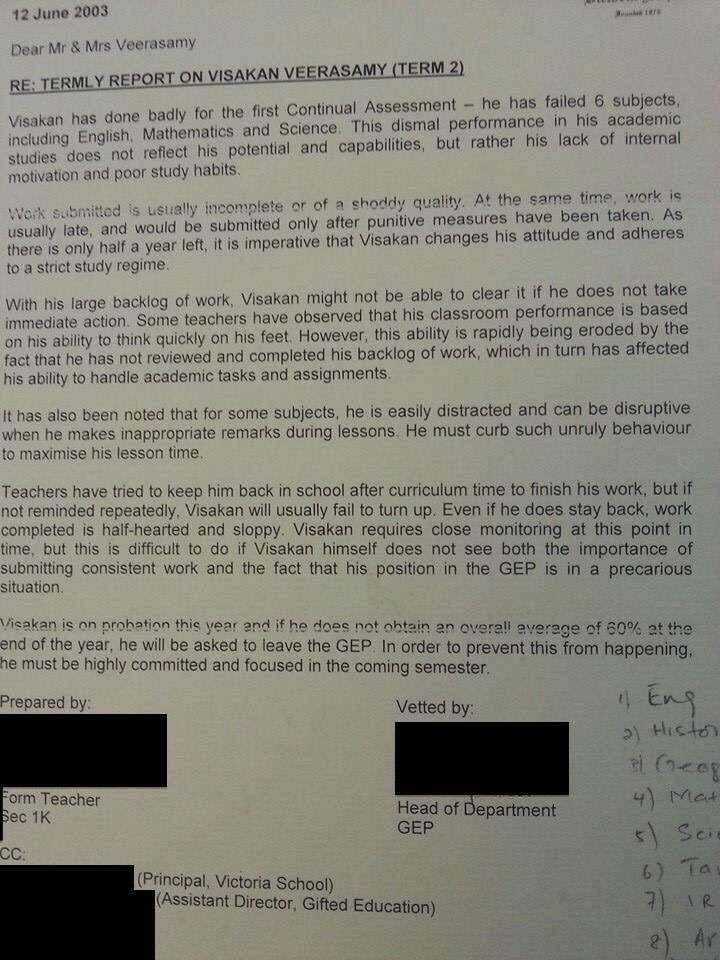When I was 13, I flunked out of the gifted education program in my country. I was told that my failure was a disappointment to the Indian community. On retrospect that was a really shitty thing to say to a child, and also very myopic, and selfish.

Being a minority means being an ambassador and representative of your entire community, whether you like it or not. You don’t have a choice in this. Your life is a battleground of collective worries and anxieties, both ingroup and outgroup.
If you want to mess with a child, an effective way to do it is to go through the parents. The child might not fully understand the complex and elaborate way you’re trying to shame him, but he’ll notice that his parents are anxious, angry and afraid.
Circling back – I didn’t notice this at the time, but this particular letter mentions two issues: internal motivation and poor study habits. I still have poor study habits 😂 but internal motivation was never actually, properly addressed. I wonder why 🤔.
The cool thing about having had this experience and having spent over a decade reflecting on it is that I’ve gotten pretty sensitive to buried assumptions and derivative reasoning. So much of social reality is buried assumptions and derivative reasoning.
“God this is MEAN. How can teachers write so insensitively with complete lack of empathy?”
I think everyone was under pressure. I think the GEP teachers were under pressure to make sure their kids succeeded- it was a small class (13 kids?) and one kid flunking would’ve been a big smudge on both the teacher’s record, and the system’s.
Interesting to consider then the sheer amount of weight that was on my 13-year-old back – my parents’, my teachers’, the Indian community’s, and arguably the GEP itself, at the time the crown jewel of Singapore’s education system. My failure would hurt everyone. Seemed like it!
The year before that I was called up to the Ministry Of Education HQ and basically interrogated by education officers – and made to sign a “Personal Statement Of Commitment”. It was pretty Kafkaesque.
At the time it never really occurred to me that I could say no to any of this. My community needed it, right? I was a child. I just happened to like reading books, & got excited and curious about things in my own way. Which is still how I am now, really.
It’s hard to overstate how much this entire experience has shaped who I am as a person. A part of me still constantly needs to prove that I can be a valuable asset to my community – to any community – and not by jumping through hoops and passing tests, but by being who I am.
To stand tall and look at society square in the eye, and say with confidence, with love, without anger or bitterness: you were wrong.
A year after I left the GEP, I started dating this really smart, funny sweet girl. Is 14 too young to be dating? We didn’t care. We made each other’s lives more tolerable. Unfortunately I’m Tamil and she’s Punjabi, and lots of people have a problem with this.
I can’t get into too much detail- this is mostly her story to tell- but again, what should’ve been a joyful experience for us was regularly bombarded with the hellish projections of other people. Our love was real, but every damn aunty had to judge us.
A quick recap of how I was feeling
- I can’t read a book without my life becoming a battleground for minority excellence
- I can’t love my girlfriend without our life becoming a battleground for inter-ethnic relationships
I’m not even 15 yet!
I felt like I had two choices:
Either I was going to think of myself a victim, have low self-esteem, hate myself and the world
Or I was going to think of myself as a hero, burdened with glorious purpose, have high self-esteem, decide it was my responsibility to fix everything.
I changed my usernames everywhere to “visa is a hero” and started blogging about how to fix society 😂 I would urge people to be kinder and more gracious, to think more critically. Several (many?) people found this arrogant and insufferable. Which I absolutely was.
I had a group of friends who were all misfits in their own ways, and we would call each other out viciously on our flaws and failings. “You are deeply, pathetically insecure,” one of them told me. “You hardly listen to anyone. You’re really full of yourself.” He was right.
“Pathetic” is a little harsh. I think we were all needlessly harsh on each other because that was the language we inherited. I think we also felt like we needed a harsh language to deal with our harsh reality. I no longer believe this. There is a better way.
We could’ve been kinder to each other – nurturing and supportive, without coddling or bullshitting each other. Challenge without antagonizing. We can all do this for each other, and we should. I try to embody this myself as an form of resistance against a needlessly cruel world.